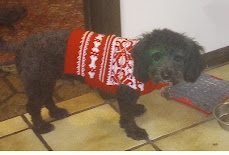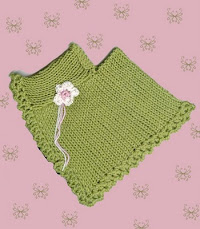(Midgauge Baby Ballet can be found on the right side of the blog. This one is a little shorter.)
I'm in the process of knitting baby stuff to donate. This is a super easy one for premies and if it weren't for all the yarn ends would go super fast. Some suggestions for those pesky things below.
Skill
Level: Beginner
Machine: Standard 4.5 mm gauge
No ribber needed
Yarn: Any that knits close to gauge. My yarn is pretty skinny.
Gauge: 8 stitches and
12 rows to one inch at T7
If you want to knit this but your
yarn obtains a different gauge, you can do the math. First, knit a gauge swatch with your yarn.
Formula: Pattern’s rows or stitches and DIVIDE them by
this pattern’s gauge, then take this figure TIMES the NEW gauge you obtained (do the same for stitches and rows)
EXAMPLE
stitches in the pattern back 44 divided
by 8 stitches per inch =5.5
your gauge ex 4st to an inch x 5.5 =
22 st
So instead of casting on 44 st, cast
on 22
In some
cases you will want to round up or down. For increases and decreases, look at
the end of the piece and spread out increases or decreases to get to the
correct amount. Fairly easy on this tiny
garment, a little trickier on large ones.
Finished size (Just one size) width of back 5.5”, length 4.5”, sleeve 3.0” (can be rolled up to make a little cuff)
Here are the
DAK schematics for the pattern:
(make one, reverse one)
This is a
Designaknit produced pattern. How to
read:
The format is Row # --Decrease or increase so many stitches --every
so many rows --So many times.
Example: On the front, on row 28, decrease one stitch
every two rows twice, so you decrease one stitch on row 28, knit 2 rows and
decrease again one stitch on row 30. If
it helps, you can write down the in-between row decreases.
Hints –
Unfortunately there are a lot of ends to work in. You can either wait until finishing and work
them in or try to weave them in as you go by hanging the end over every other
needle before you knit the row. You can
also save some ends by leaving a long one at the bottom of the piece to seam
with. RC stands for row count.
FF means full fashioned. This is why the front edges don’t roll. To decrease, move the 4th stitch from the edge to the 3rd, the move all 3 stitches in to fill the empty needle. To increase, move 3 stitches out one needle, then take the purl bump on an adjacent stitch and hang it on the empty needle so that there is no hole.
DIRECTIONS
IN WORDS
*****For all pieces, do the 4 row rolled hem at a tighter tension (T3) then change to T7 and RC000 to start the schematic.*****
Back
With waste
yarn, cast on 44 stitches. Knit several
rows at looser tension.
With main
yarn ewrap left to right. Change to T
3. Knit 4 rows (might be a little
tight).
RC 000
Change to T 7 and knit to RC 29. Bind off 3 stitches, knit one row.
On row 30
bind off 3 stitches. Knit to RC 54. Take off these stitches in 3 parts. Put all
stitches in hold, machine to hold.
For the first shoulder take off 12 stitches on several rows
of waste yarn. Remove from machine.
Bind off the next 30 stitches, decreasing one stitch on the
10th and 20th needle. Remove from machine.
Take machine off hold and take off the last 12 stitches on
several rows of waste yarn. Remove from
machine.
Fronts: Make one and reverse one.
With waste
yarn, cast on 42 stitches. Knit several
rows at looser tension.
With main
yarn ewrap left to right. Change to T
3. Knit 4 rows (might be a little
tight).
RC 000 Change to T 7 and follow the schematics using full fashioned decreases. On row 30 for right side and 29 for left side (next to carriage) bind off 3 stitches and continue with the other side ff decreases. Knit to RC 54 and take the 12 st off on waste yarn.
Sleeves
With waste
yarn, cast on 28 stitches. Knit several
rows at looser tension.
With main
yarn ewrap left to right. Change to T
3. Knit 4 rows (might be a little
tight).
RC 000 Change to T 7 and knit to RC 17. Increase ff one stitch both sides. Knit to RC 34. Increase ff one stitch both sides. You now have 32 stitches. Knit to RC 35 and take off on several rows of waste yarn.
Finishing
Join the
shoulder stitches. Put your carriage on the left. With the right side of the back piece facing
you, hang one set of 12 shoulder stitches.
With the wrong side of one matching front, hang the 12 shoulder
stitches. Pull the needles out and push
the knitting to the back so that the stitches knit off properly. Knit one row and bind off. (I like to bind off around gate pegs to get
the bind offs even.)
Do the same
for the other shoulder.
Join the sleeves.
Put your carriage on the left. With
the right side of one sleeve facing you, hang the 32 stitches. If you hang 16 on the left of zero and 16 on
the right, it’s easier to get the seam to come out right. This is a little tricky. With the wrong side of the sweater facing
you, hang the shoulder seam at zero.
With a 3 prong tool to measure out nicely, pick up whole stitches from the body. Skip a stitch of the garment and hang the
next 3 stitches. Try really hard to
stick your tool in the same ditch every time.
Looks wonky if you don’t.
Continue
picking up until all sleeve stitches have been attached to the body. Now take a ruler and measure from the bottom
of the sweater to the underarm. Over on
the other side, begin hanging stitches at the same place so that the front and
back are not off kilter. Fill in the
stitches until all sleeve stitches are loaded up.
Pull all
needles out and push knitting back so that the stitches knit off properly. Knit one row left to right and bind off.
Do the same
on the other side.
TIES
- You need 4
Pick up 3
stitches at a corner of the garment.
Hang a wt on the garment. At T 6
Knit 60 rows. If you want to knit an I
cord, push in one part button and knit 120 rows. Just knitting the tie plain causes it to roll
and it’s not too distinguishable from an I cord and goes faster. Bind off by putting the two outer stitches on
the center, cut the yarn and pull through to bind off/ fasten off.
Make 3 more
, one at each corner.
SEAM
Mattress
stitch the sides and the sleeves. Run in
yarn ends. Wash in detergent that doesn’t have perfume.
Steam a little if you think it’s necessary.
Donate to
your favorite hospital or charity. Might
want to put your donation in a plastic bag to keep it clean.










































































No comments:
Post a Comment